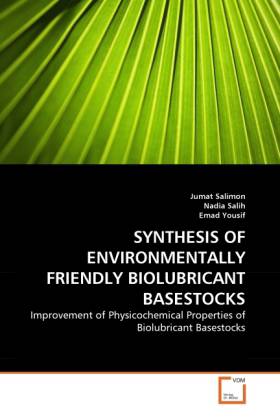
- Afhalen na 1 uur in een winkel met voorraad
- Gratis thuislevering in België vanaf € 30
- Ruim aanbod met 7 miljoen producten
- Afhalen na 1 uur in een winkel met voorraad
- Gratis thuislevering in België vanaf € 30
- Ruim aanbod met 7 miljoen producten
Zoeken
Synthesis of Environmentally Friendly Biolubricant Basestocks
Improvement of Physicochemical Properties of Biolubricant Basestocks
Jumat Salimon, Nadia Salih, Emad Yousif
Paperback | Engels
€ 71,95
+ 143 punten
Omschrijving
Plant oils and fats are important constituents of human and animal foodstuffs. Certain grades are industrially used and, together with carbohydrates and proteins, are important renewable resources compared to fossil and mineral raw materials, whose occurrence is finite. In concepts for new products, the price, performance, and product safety criteria are equally important and have a correspondingly high importance right at the start of product development. To ensure a high degree of product safety for consumers and the environment, renewable resources have often been shown to have advantages when compared with petrochemical raw materials and can therefore be regarded as being the ideal raw material basis. Results from oleochemistry show that the use of plant fats and oils allows the development of competitive, powerful products, which are both consumer-friendly and environment-friendly. In the lubricant sector fatty acid-based esters have proven to be powerful alternatives to conventional mineral oil products.
Specificaties
Betrokkenen
- Auteur(s):
- Uitgeverij:
Inhoud
- Aantal bladzijden:
- 80
- Taal:
- Engels
Eigenschappen
- Productcode (EAN):
- 9783639338706
- Verschijningsdatum:
- 8/06/2011
- Uitvoering:
- Paperback
- Formaat:
- Trade paperback (VS)
- Afmetingen:
- 152 mm x 229 mm
- Gewicht:
- 127 g

Alleen bij Standaard Boekhandel
+ 143 punten op je klantenkaart van Standaard Boekhandel
Beoordelingen
We publiceren alleen reviews die voldoen aan de voorwaarden voor reviews. Bekijk onze voorwaarden voor reviews.







